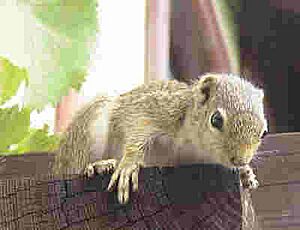Gambian sun squirrel facts for kids
Quick facts for kids Gambian sun squirrel |
|
|---|---|
 |
|
| Conservation status | |
| Scientific classification |
|
| Kingdom: | Animalia |
| Phylum: | Chordata |
| Class: | Mammalia |
| Order: | Rodentia |
| Family: | Sciuridae |
| Genus: | Heliosciurus |
| Species: |
H. gambianus
|
| Binomial name | |
| Heliosciurus gambianus (Ogilby, 1835)
|
|
| Subspecies | |
|
|
| Script error: The function "autoWithCaption" does not exist. | |
| Synonyms | |
|
|
Script error: No such module "Check for conflicting parameters".
The Gambian sun squirrel (scientific name: Heliosciurus gambianus) is a type of rodent. It belongs to the Sciuridae family, which includes squirrels. These squirrels live in many parts of Africa. You can find them in countries like Angola, Gambia, Kenya, and Zambia. They like to live in savannas, which are grasslands with scattered trees.
Contents
How Scientists Name and Group the Gambian Sun Squirrel
Scientists like to give every animal a special name. This helps them organize and study living things. The Gambian sun squirrel was first described in 1835. An Irish naturalist named William Ogilby gave it the name Sciurus gambianus.
Later, scientists decided to move this squirrel to a different group. It was placed in the genus Heliosciurus. This is why its full scientific name is now Heliosciurus gambianus. Scientists believe there might be several types of Gambian sun squirrels.
What Does the Gambian Sun Squirrel Look Like?
The Gambian sun squirrel is a medium-sized squirrel. Its body, from head to tail, is about 17 to 24 centimeters (7 to 9 inches) long. Its tail is even longer, measuring about 18 to 26 centimeters (7 to 10 inches).
Its fur is usually greyish. It often has a speckled or "grizzled" look. You might notice a lighter grey ring around its eyes. Its throat and belly are also a pale color. The tail is quite striking! It has bold black and white rings, usually around fourteen of them.
Where Do Gambian Sun Squirrels Live?
Gambian sun squirrels live across a large part of tropical Africa. Their home range stretches from countries like Senegal and the Gambia in the west. It goes all the way to Ethiopia and Kenya in the east. There is also a separate group of these squirrels further south. You can find them in Angola and Tanzania.
These squirrels prefer to live in wooded savannas. These are open grasslands with scattered trees. They often move through the tree branches. However, they sometimes come down to the ground. They can also live in farms and other areas changed by people.
Is the Gambian Sun Squirrel in Danger?
The Gambian sun squirrel is a common animal in its grassland homes. It lives across a very wide area. Scientists believe there are many of these squirrels in total.
The number of Gambian sun squirrels does not seem to be decreasing. There are no major threats that worry scientists. These squirrels are good at living in places changed by humans. They also live in many protected areas. Because of all this, the International Union for Conservation of Nature (IUCN) says they are of "least concern". This means they are not currently in danger of disappearing.
 | Aaron Henry |
 | T. R. M. Howard |
 | Jesse Jackson |


